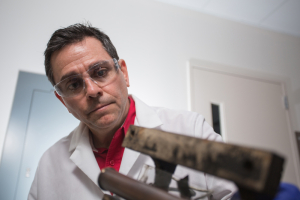SPE selects Kostarelos for Distinguished Achievement Award
The Gulf Coast Region of the Society of Petroleum Engineers (SPE) recognized University Houston professor, Konstantinos Kostarelos, with the 2018 Regional Distinguished Achievement Award for Petroleum Engineering Faculty.
“Just being nominated for this award is rewarding when you know that students appreciate your efforts to pass on knowledge to them; being selected is really special,” Kostarelos said. “I am humbled when I see the names of others who received this award in the past.”
Previous UH recipients of the award include Subsea Engineering Program Director Phaneendra Kondapi in 2017 and Tom Holley – former professor in petroleum engineering – in 2014. With Kosterolos, that's three UH recipients in the last five years.
Kostarelos, an associate professor at the Cullen College of Engineering, is known for innovative research in the oil and gas field.
In 2017, he and his students built a prototype device to address the issue of blockage inside crude oil pipes – a common and costly problem in the oil industry. The process involves putting two electrical plates, highly charged at 4,000 volts, into the pipe. Blockage-causing asphaltene molecules are then pulled to the plates and removed from the oil.
The year before, Kostarelos designed a way to use applied enhanced oil recovery methods to clean up the site of an underground fuel leak in Denmark, recovering 35,000 kilograms of jet fuel. He also developed an optical fiber chemical sensor that can be used in the subsurface environment.
He is part of a team of UH researchers working with the oil industry to develop new ways to predict when an offshore drilling rig is at risk for a potentially catastrophic accident. The work is funded by a $1.2 million grant from the National Academies of Sciences, Engineering and Medicine. It was inspired by the Deepwater Horizon explosion in 2010, which left 11 crew members dead and spilled more than 3 million barrels of oil into the Gulf of Mexico, sparking efforts to better understand the movement of hydrocarbons in offshore drilling.
Other projects Kostarelos and his students are tackling involve improving oil recovery for unconventional reservoirs and working with alternatives to carbon dioxide that could reduce greenhouse gas emissions.
The SPE award recognizes Kostarelos’ outstanding contributions at the regional level. He will receive it at the 2018 SPE Awards and Scholarships Banquet on May 25 at the Hess Club in Houston.
SPE is the primary professional organization for petroleum engineers around the world, with the Gulf Coast Section of SPE alone boasting more than 17,000 members. The mission of the SPE-GCS is to enhance technical knowledge among its members, promote professional development and networking in industry, support local education initiatives and perform community service in the Greater Houston area.
